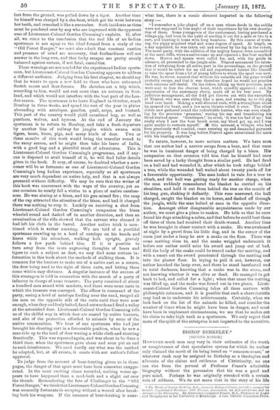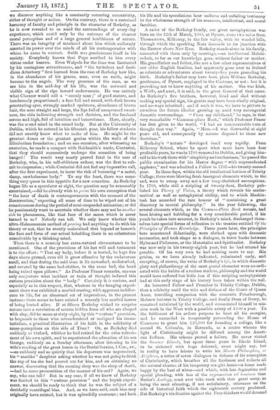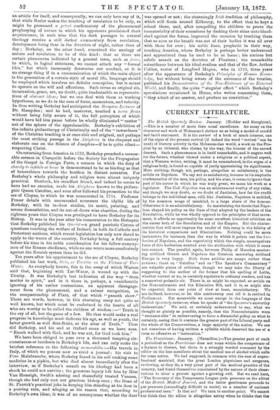BISHOP BERKELEY.* [SECOND NOTICE.]
HOWEVER much men may vary in their estimates of the worth or completeness of that speculative system for which its author only claimed the merit of its being based on "common-sense," or whatever rank may be assigned to Berkeley as a theologian and advocate of the claims and evidences of Christianity, no one can rise from the perusal of Professor Fraser's admirable biography without the persuasion that his was a good and pure mind. Perhaps he was originally streaked with a certain vein of oddness. We do not mean that in the story of his life The Works of George Berkeley, D.D.,,formerly Bishop of Cloyne, includi»g many of his hitherto Unpublished Writings; with Preface, Annotations, his Life and Letlers, and an Account of Ms Philosophy. By Alexander Campbell Fraser, M.A., Professor of Logic and Metaphysics in the University of Edinburgh. 4 vols. Oxford: Clarendon Press. we discover anything like a constantly recurring eccentricity, either of thought or action. On the contrary, there is a sustained harmony of faculty and principle in the character of Berkeley, as he is now revealed to us amid the surroundings of every-day experience, which could only be the outcome of the clearest moral perception and of a large general healthiness of nature. There was an integrity of manhood about him which uniformly asserted its power over the minds of all his contemporaries with whom he can-ie in contact. Swift was graciousness itself in his society. Everybody knows that Pope ascribed to him every virtue under heaven. Even Walpole for the time was fascinated by his contagious attractiveness, and "the turbulent and fasti- dious Atterbury "first learned from the case of Berkeley how like, in the abundance of his graces, man, even on earth, might become to the angels. The very presence of the man, as we see him in the mid-day of his life, was the outward and visible sign of the ripe inward endowments. He was entirely what Chaucer would call a "seemly man ;" of good stature, and handsomely proportioned ; a face full and round, with dark brown penetrating eyes, strongly marked eyebrows, abundance of brown hair, the nose straight and large, the lips full of compressed sweet- ness, the chin indicating strength and decision, and the forehead serene and high, full of intuition and benevolence. Here, clearly, was the scond mind in the sound body. But at the University of Dublin, which he entered in his fifteenth year, his fellow students did not exactly know what to make of him. He might be the greatest dunce or the greatest genius within the walls of the Elizabethan foundation ; and on one occasion, after witnessing an execution, he made a compact with Goldsmith's uncle, Contarini, that they should successively undergo the sensation of being hanged ! The result very nearly proved fatal in the case of Berkeley, who, in his self-oblivious ardour, was the first to sub- mit to suspension ; while Contarini did not feel any imperative call, after the first experiment, to incur the risk of becoming "a moist, damp, unwholesome body." To say the least, there was some- thing very queer in this appetite for a new sensation. As Berkeley began life as a speculator at eight, the question may be reasonably entertained,—did he already wish to prone his own conception that "the hour of death is contemporaneous with the moment of the Resurrection," expecting all sense of time to be wiped out of his consciousness during the period of semi-suspended animation; or did he passionately want to ascertain whether there may not be another side to phenomena, like that face of the moon which is never turned to us? Nobody can tell. We only know whether this ultra-Hahnemannic method of proving had anything to do with his theory or not, that he stoutly maintained that beyond or beneath the face and form of our actual beholding there is no substratum conceivable by a thinking mind.
Then there is a scarcely less extra-natural circumstance to be mentioned. One of the provisions of his last will and testament is to the effect : "That my body, before it is buried, be kept five days above ground, even till it grow offensive by the cadaverous smell, and that during the said time it lie unwashed, undisturbed, and covered by the same bed-clothes, in the same bed, the head being raised upon pillows." As Professor Fraser remarks, one can only conjecture what incident or train of thought induced this curious provision about the "body." Certainly it is curious, and especially so in this respect, that, whereas in the hanging experi- ment there was exhibited a morbid craving, with apparent indiffer- ence to life, for an abnormal set of impressions, in the present instance there seems to have existed a scarcely less morbid horror of being buried alive. If at fifteen Berkeley wished to surprise nature into a revelation of secrets hidden from all who are clasped with clay, did he mean at sixty-eight, by this " curious " provision, to bequeath to those who misunderstood or maligned his imma- texialism, a practical illustration of his faith in the solidarity of sense-perceptions on this side of Time ? Or, as Berkeley died suddenly at Oxford, whither he had retired for the calm refresh- ment of his own spirit, and to superintend the education of his son George, suddenly on a Sunday afternoon, after listening to his wife's reading of the great lesson in the Burial Service, 1 Cor., xv., —so suddenly and so quietly that his departure was unperceived, his " starlike " daughter asking whether he was not going to drink the cup of tea she had poured out for him, and on obtaining no answer, discovering that the seeming sleep was the sleep of death, —had he some premonition of the manner of his end? Again, we say, who can tell ? But in any case, if all we knew of Berkeley was limited to this "curious provision" and the boyish experi- ment, we should be ready to think that he was the subject of a decidedly centrifugal bias. And, as we have said such bias may
his life and his speculations bear nuifortu and unfailing testimony to the wholesome strength of his sensuous, intellectual, and moral faculties.
A cadet of the Berkeley family, our great metaphysician was born on the 12th of March, 1685, at Dysert, some two miles from Thomasto wn, Kilkenny, in the fair valley, with its wooded hills, through which the sparkling Note desceuds to its junction with the Barrow above New Ross. Berkeley stands alone in his family, connected with them only by marriage,—an intellectual Melchi- zedech, so far as our knowledge goes, without father or mother. His grandfather and father, like not a few other representatives of our older English families, had apparently gone over to Ireland as colonists or adventurers about twenty-five years preceding his birth. Berkeley's father may have been plain William Berkeley, gentleman, of Dysert, employed in the Customs, or not ; but it is provoking not to know anything of his mother. She was Irish, a Wolfe, and aunt, it is said, to the great General of that name. As Berkeley's five brothers, however, lived and died without making any special sign, his genius may have been wholly original, and no-ways inherited ; and if such it was, we have to picture to ourselves the future idealist growing up amid very uncongenial domestic surroundings. "From my childhood," he says, in that very remarkable "Common-place Book," which Professor Fraser has first given to the world, "I had an unaccountable turn of thought that way." Again, " Mem.—I was distrustful at eight years old, and consequently by nature disposed to these new doctrines."
Berkeley's " nature " developed itself very rapidly. From. Kilkenny School, where he spent what must have been four profitable years, he was in 1700 removed to Dublin, and giving him- self to his work there with "simplicity and enthusiasm," he passed ther public examination for his Master degree "with unprecedented applause," and was admitted a Fellow in 1707—his twenty-second year. In those days, within the old intellectual horizon of Trinity College, there were blowing fresh insurgent elements which, in the end, were to sweep away not a few long-cherished assumptions. In 1709, while still a stripling of twenty-four, Berkeley pub- lished his Theory of Vision, a theory which reveals his mathe- matical as well as metaphysical ability, and to which Mackin- tosh has accorded the rare honour of "containing a great discovery in mental philosophy." In the year following, the several elements which, as the Common-Place Book reveals, had been hissing and bubbling for a very considerable period, if his youth be taken into account, in Berkeley's mind, discharged them-. selves into special forms of reflection in the treatise entitled Of the Principles of Human Knowledge. Three years later, the principles here announced didactically, were clothed upon with dramatic accessories, and took shape as a dialogue, in three books between Hylas and Philonous, or the Materialist and Spiritualist. Berkeley was now only in his twenty-eighth year, but he had uttered his parable. Of his very own he had nothing more to say. His genius, as we have already indicated, culminated early, and, excepting, of course, the value of Berkeley's life, in which domestic piety and philanthropy of the most genial character were co-ordi- nated with the habits of a recluse student, philosophy and the world would have suffered but little loss if this stripling metaphysician had at this early stage of his history been taken within the veil. an article for itself, and consequently, we can only here say of it, that while Butler makes the teaching of revelation to be only, as might be presumed a priori confirmatory of the phenomenal prophesying of nature in which his opponents proclaimed their acquiescence, in such wise that the dark passages in natural theology receive a still darker commentary from revelation, development being thus in the direction of night, rather than of day ; Berkeley, on the other hand, conceived the analogy of nature and revelation to be of this kind : that as there are certain phenomena indicated by a general term, such as force, to which, in logical strictness, we cannot attach any "formal idea," but which immensely determine our conduct, so it is no strange thing if in a communication of which the main object is the generation of a certain style of moral life, language should be employed which involves no definite conception, but is meant to operate on the will and affections. Such terms as original sin, incarnation, grace, are, no doubt, quite inadmissible as representa- tives of abstract ideas; but we can deal with them as working hypotheses, as we do in the case of force, momentum, and velocity. In thus writing Berkeley had anticipated the Bampton Lectures of Dr. Hampden ; and he had, moreover, touched a terra firma without being fully aware of it, the full perception of which would have bid him pause before he wholly eliminated " matter " out of the sphere of the apprehensible. Berkeley's exhibition of the infinite philanthropy of Christianity and of the "inwardness" of the Christian teaching is at once able and original, and perhaps the most striking passage in the Alciphron is the eloquent and elaborate one on the Silence of Josephus—if he is quite silent— respecting Christ.
On returning from America in 1732, Berkeley preached a memor- able sermon in Cheapside before the Society for the Propagation of the Gospel in Foreign Parts, a sermon in which the duty of charity to infidels at home is demonstrated to be as binding as that of benevolence towards the heathen in distant countries. For Berkeley's whole philosophy and religion were almost uniquely practical. Sherlock, his steadfast friend, and indeed he seems to have had no enemies, made his Alciphron known to the philoso- phic Queen Caroline, and soon after followed his promotion to the see of Cloyne, to which he was consecrated in 1734. Professor Fraser details with unconcealed reverence the idyllic life of Berkeley, with its in-door studies, its music, painting, and serene domesticities, and its out-of-doors wise charities, during the eighteen years that Cloyne was privileged to have Berkeley for its Bishop. It was in the year after his consecration to the Bishopric that Berkeley published his Querist—a grand patriotic Catena of questions touching the welfare of Ireland, in both its Catholic and Protestant sections, which recent legislation has only now dared to apply to the wants of the country, Berkeley being a full century before his time in his noble consideration for his fellow-country- men of the Roman obedience, while no one wrote more conclusively against the Romish system than he did.
Ten years after his appointment to the see of Cloyne, Berkeley published his last work, Sins, or Treatise on the Virtues of Tar- Water. As everybody knows, this is the may of which Warton said that, beginning with Tar-Water, it wound up with the Trinity. It was Berkeley's last indication of the way "from matter to spirit," and in it there is, perhaps, a considerable ignoring of his earlier contentions, an apparent disengage- ment from the phenomenal, and a calmer recognition, in the companionship of Plato, of that which " passeth show." There are words, however, in this charming essay not quite so well known, but which must be enshrined in the hearts of all who are worthy to be called the children of wisdom :—" Truth is the cry of all, but the game of a few. He that would make a real progress in knowledge must dedicate his age, as well as youth, the latter growth as well first-fruits, at the altar of Truth." Thus did Berkeley, and his end at Oxford came as we have seen. "Enoch walked with God, and he was not, for God took him."
We have been obliged to pass over a thousand tempting cir- cumstances or incidents in Berkeley's life, and can only make the briefest reference to the following memorabilia :—His travels in Italy, of which we possess now so vivid a journal ; his visit to Pere Malebranche, whom Berkeley found in his cell cooking some medicine in a pipkin, but who died almost immediately after the interview, as if Berkeley's assault on his ideology had been a shock he could not survive ; the generous legacy left him by Miss Van Homrigh, Swift's adoring and shamefully treated Vanessa, though she had only met our gracious bishop once ; the Dean of St. Patrick's practical joke in keeping him standing at his door in a pouring rain, and alleging as his reason that, according to Berkeley's own ideas, it was of no consequence whether the door was opened or not ; the charmingly Irish tradition of philosophy, which still floats around Kilkenny, to the effect that he kept a school there, and, after compelling the children to prove the immateriality of their sensations by dashing their shins unto blood- shed against the forms, improved the occasion by teaching them that so scon as the breath was out of their bodies it was all over with them for ever ; his noble lines, prophetic in their way, touching America, where Berkeley is perhaps better understood and appreciated than he used to be at home ; his curious but subtle assault on the doctrine of Fluxions ; the remarkable coincidence between his ideal-realism and that of the Rev. Arthur Collier, rector of Longford Magna, who in 1713, three years after the appearance of Berkeley's Principles of Human Know- ledge, but without being aware of the existence of the treatise, published his Demonstration of the Non-Existence of an External World, and finally, the quite "singular effect" which Berkeley's speculations occasioned in Hume, who writes concerning them, "they admit of no answer, and produce no conviction."




































 Previous page
Previous page